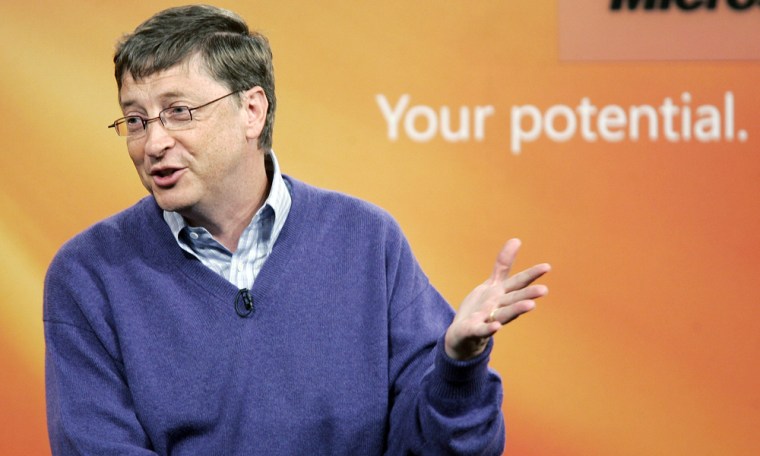Say it ain't so, Bill.
The news from Microsoft of the imminent exit of Bill Gates, the rapacious capitalist, tech-nerd paragon and vaccinate-the-world billionaire who has ruled and personified the company for 30 years, is at once shocking ... and inevitable. It's about time.
The biggest question, though, is whether it will turn out to be a lie. Not a big fat one, not even an intentional one, but a lie no less.
Microsoft claims its chairman and co-founder (read: its patriarch and mentor and the driving force in its genetic need to dominate every market it enters, or at least to try) is stepping down now as the company's software overlord and will abandon all day-to-day duties entirely in two years, leaving to work on philanthropy. This change means a lot less than the headlines would have it—and a lot more; we'll get to why in a moment. But it is difficult to believe it will really happen at all, that Gates will be able to let go, just when his company is losing in the market and more vulnerable than ever before.
(MSNBC is a Microsoft - NBC joint venture.)
Fearless prediction: We may see Gates depart for a time and recharge his soul, only to return to rescue his company from ignominy and obsolescence if things get bad enough. This plot point (or ploy) worked well for Steve Jobs, who left Apple Computer in 1985 and returned a decade later to resuscitate it; Microsoft could use a little comeback magic, too.
My basis for this, admittedly, is flimsy. It derives from knowing Gates, a little bit, here and there, since 1984. One night in the early 1980s, when he was parlaying an unlikely contract with IBM into a shot at defining and dominating an entire new industry, Gates partied until 3 in the morning with a few of us hangers-on. He seemed driven by the elemental forces that motivate all great entrepreneurs, artists and scientists (the dual pursuits of showing everyone how smart you are … and trying to impress your date). On another night, at dinner for four, three of us listened raptly while he held forth on big tech thoughts, so fiercely focused that he was oblivious to the sheen of vinaigrette that covered his entire chin.
By the ’90s Gates was full of himself, and rightly so, scorning has-beens like his old benefactor, IBM; conquering newcomers like Netscape; and extolling the wonders of the tidal wave that had just almost overwhelmed him: the Internet. He even tried to invade the businesses of his customers — banking, online retailing, media and entertainment.
By the start of this decade, Gates was self-righteous and unrepentant, unfazed by the federal government's effort to break apart his ruthless and monopolistic empire. Microsoft hadn't ever really done anything to hurt consumers, but it had done plenty to hurt a passel of rivals, and some of them ran tattling to the Justice Department. Years of antitrust scrutiny had emasculated IBM and left its executives haunted and wary of getting too rough; at Microsoft it invigorated the faithful, and Bill's bullies talked gleefully and on the record of their plans to immolate the competition.
And this same Gates now chooses to retreat from the fray? Just when Microsoft faces its biggest threat yet — the threat of being rendered irrelevant? The open-source software movement for cheap and free code, embodied by Linux, and the rise of Google have bumped Microsoft from center stage. Google is tech's star now, with its breathless stock surge, ample search prowess and propensity to give away, free of charge and accompanied by ads, the same software tools that provided billions in profits for Microsoft years before Google was even a trademark.
Declining profits
Microsoft stock has gone only lower since the tech bubble burst in 2000. In five years Microsoft's share price is down 46 percent; SAP's is up 8 percent. Had you invested $10,000 in Microsoft in February 2001, you would have only $8,354 five years later, a 16 percent decline — twice the drop in the S&P 500. And the company has blown through $7 billion in losses in four years trying to build new businesses—the X-box videogame player, the MSN online service, wireless. Some 140 percent of its profits hail from product lines that debuted ten or 20 years ago.
Vista, its next turgid Windows upgrade, is two years late; it makes one yearn for the days of Windows 95, which ran late but managed to come out in August of 1995. And Gates' company has underwhelmed the world with its big push into Web services or "Web 2.0," knitting together all manner of software systems for seamless integration of blah-blah-blah-you’ve-heard-it-a-thousand-times-before-so-who-we-kiddin'.
No radical changes
Even if Gates truly cuts back, we won't see huge changes at his company. He will remain chairman and Microsoft's largest holder (his stake is at 9.6 percent). He handed the chief executive role to his longtime No. 2, the fierce and effusive Steve Ballmer, six long years ago, and if you want truly radical change at Microsoft, you'd have to get rid of that guy, too. Gates told reporters yesterday that Ballmer has done "a fantastic job by every measure." He left out the most important one: stock price. Were that the sole metric, it would be time for both men to go.
And yet, inside Microsoft, it may feel instantly different now that Gates has set a timetable for leaving the company altogether. To Microsofties, he is their Big Brother and progenitor, their brainiac-maniac inspiration. The flaw in this picture is that Gates, by exiting now, would leave a loser. It is startlingly unlike him to bail out so unceremoniously, before he has had one last chance to really kick some butt. Somehow, I'm not buying it.
